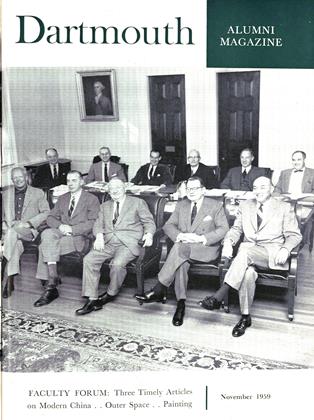By Robert Saunders Dowst '12. New York:Dodd, Mead, 1959. 182 pp. $3.50.
The death on March 20, 1959, Robert S. Dowst '12 ended a prolific career in free-lance turf writing which brought him a world-wide reputation as an expert in the art of handicapping race horses. His first book on this subject, Playing the Races, appeared in 1934 and is now in its eleventh edition. His sixth book on the subject, The Odds, the Players,the Horses, came out shortly after his death and should further enhance his reputation in the turf world.
As Mr. Dowst points out, some two and one-half billion dollars are bet each year at racing tracks in twenty-four states where mutuel wagering is legalized, and a much greater amount is bet through illegal "handbooks." It is, therefore, safe to assume that a great many members of our society are interested in betting on the horses. The vast majority of these people, however, have little concept, if any, of the basis for making bets and rely for the most part on "hunches," on ill-advised "systems" or on the predictions of daily newspaper handicappers whose knowledge and opinions are often not much better than those of the average race-goer.
In this current volume Mr. Dowst details the many pitfalls to be avoided in betting on the races and then outlines, at some length, a system of handicapping horses which is based on known factors and sound judgments. It is not a system which is likely to produce sizable gains over a short period of time, nor is it a system which can be readily grasped and put into immediate operation. The book documents an approach to wagering which is business-like in every sense of the word. It calls for careful reading and analysis and then a thorough, continuing study of all factors in each race before bets are placed. It is in many ways the approach followed by the "big time" gamblers, the men who wager carefully over long periods of time, betting on a given horse in a given race perhaps only once a month.
It has been reported that over the years Mr. Dowst realized a 20% profit on his racetrack wagering. This certainly indicates that the modest sura needed to purchase this volume might well pay dividends in the end.
 View Full Issue
View Full Issue
More From This Issue
-
 Feature
FeatureOur Place in the Sky
November 1959 By PROF. MILLETT G. MORGAN, -
 Feature
FeatureCan Chinese Civilization Survive Communism?
November 1959 By WING-TSIT CHAN -
 Feature
FeatureSocial Responsibility in Painting
November 1959 By CHARLES T. MOREY, -
 Feature
FeatureThe Commitment of Fellowship
November 1959 By PRESIDENT JOHN SLOAN DICKEY -
 Feature
FeatureSEASONS AND CAESARS
November 1959 By JIM FISHER '54 -
 Feature
FeatureDartmouth and Saint Francis
November 1959 By GORDON M. DAY
CLIFF JORDAN '45
-
 Article
ArticleSoccer
December 1952 By Cliff Jordan '45 -
 Article
ArticleGolf
June 1954 By CLIFF JORDAN '45 -
 Article
ArticleFinal Ivy League Strandings
JANUARY 1959 By CLIFF JORDAN '45 -
 Article
ArticleDartmouth 9, Harvard 0
December 1959 By CLIFF JORDAN '45 -
 Article
ArticleFreshman Sports
December 1959 By CLIFF JORDAN '45 -
 Feature
FeatureThe Widmayer Touch
OCTOBER, 1908 By Cliff Jordan '45
Books
-
 Books
BooksShelf Life
Nov/Dec 2002 -
 Books
BooksSUBMARINE! THE STORY OF UNDERSEA FIGHTERS
January 1943 By Bernard Brodie -
 Books
BooksA MODERN CONQUISTADOR. ROBERT BONTINE CUNNIN GHAME GRAHAM
February 1933 By John Hurd Jr -
 Books
BooksSubways Run on Time
May 1975 By MORTON M. KONDRACKE '60 -
 Books
BooksLIQUIDITY AND STABILITY
January 1941 By Ray V. Leffler -
 Books
BooksELEAZAR WHEELOCK: FOUNDER OF DARTMOUTH COLLEGE,
October 1939 By Wayne E. Stevens

